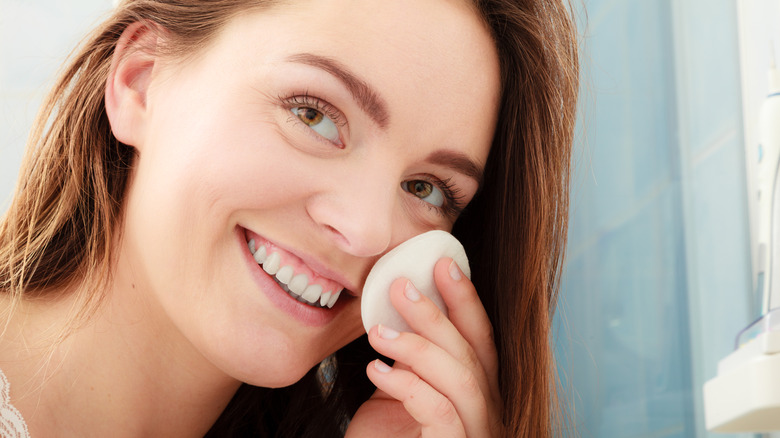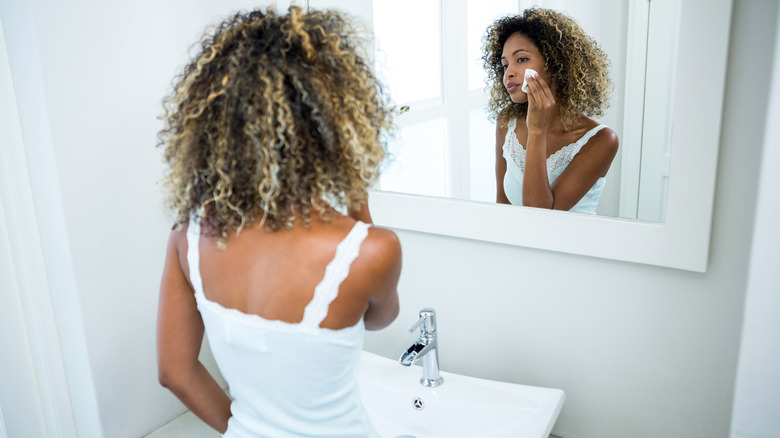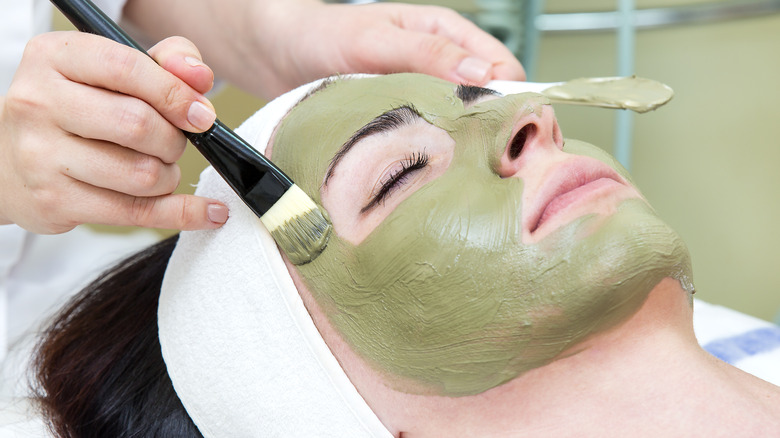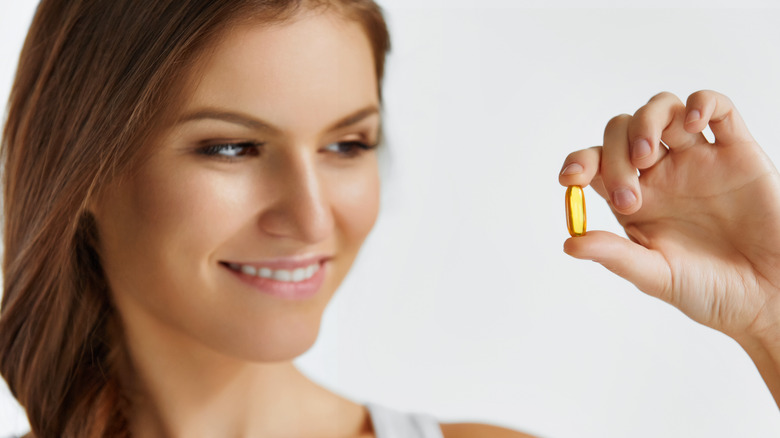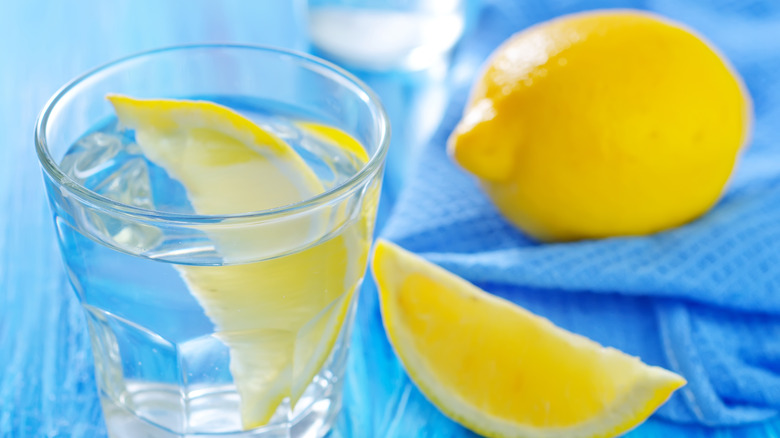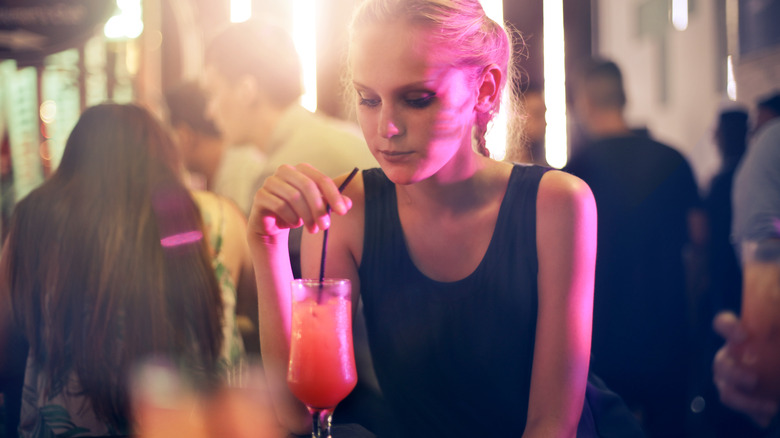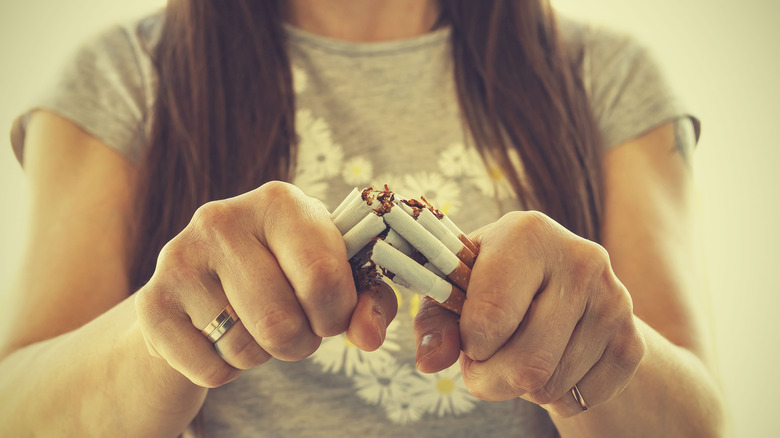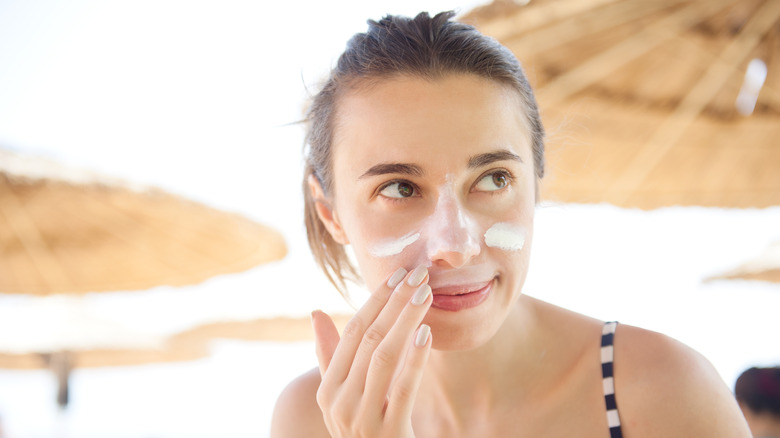Things People With Great Skin Do Every Day
Are there secrets to having a fabulously glowing complexion, or do people with perfect skin just have the luck of genetics on their side? While the genes you inherited from your parents naturally make up a chapter of your skin's story, they certainly don't tell the whole tale.
So what do people with great skin do every day? What lifestyle habits can you adopt now to achieve the luminous skin of your dreams? Fortunately, it may not be as challenging as you think. In fact, you are likely regularly doing some of these things already.
Wash off that makeup
Of course it is oh-so-tempting to hit the sheets as soon as you get home from a long evening out on the town, but taking that extra few minutes to clean off your makeup is imperative for beautiful skin. Makeup left overnight on your skin, particularly heavy oil-based foundations and primers, causes clogged pores which can easily lead to acne.
If the risk of unsightly acne isn't enough to convince you, would the risk of premature wrinkles do the trick? As New York City dermatologist Dr. Eric Schweiger told the Huffington Post, "Free radicals from the environment (often in the form of pollution) remain on the skin when you do not clean your face properly at night. Free radicals cause collagen breakdown over time, which results in the development of fine lines and prematurely aged skin."
Schweiger advised being diligent about removing eye makeup as well. Eye makeup, when left on overnight, can lead to clogged hair follicles that harbor the bacteria that cause styes or other eye infections.
Use the right products
Utilizing skin care products for great skin is not about spending a fortune or piling on a ton of product at once. The key lies in knowing what your skin needs and buying the appropriate products to get the job done. If you aren't sure how to determine your skin type, a visit to a dermatologist or aesthetician would be a smart move.
Toronto dermatologist Dr. Julia Carroll told Elle Canada that a universal rule for skin care is to "abide by the following skin care commandments: cleanse, moisturize, protect, and treat." Carroll advised to invest the real money in the treatment part of your plan, like a good topical vitamin C (one with at least 10 percent ascorbic acid) for day and a glycolic acid or retinol for night. According to Carroll, "seeing an improvement in acne, discoloration, fine lines, and wrinkles can take up to eight weeks," so a little patience will also be an integral part of your routine.
Take the right supplements
Could beauty actually be found in a pill? While there certainly aren't any magic potions out there to instantly erase all of your skin woes, there are a handful of supplements that are proven to boost the health of your body's largest organ.
Chock full of gamma-linolenic acid (GLA), an essential omega-6 fatty acid, evening primrose oil provides a variety of benefits to the body, including beautiful skin. Says Dr. Andrew Weil, practitioner of integrative medicine, "Evening primrose oil nourishes the skin, hair, nails, even the joints. The GLA it contains helps strengthen the skin barrier and reduces moisture loss... I recommend it for arthritis, autoimmune disorders, premenstrual syndrome, and for healthy growth of skin, hair, and nails." Weil suggests a dosage of 1,000 milligrams per day and advises waiting eight weeks to see results.
If you are already taking an omega-3 supplement, you are on the right track for gorgeous skin. Not only a great supplement for fighting off cardiovascular disease and Alzheimer's, omega-3 is also shown to assist the skin in warding off UV-inflicted sun damage. Facialist Ildi Pekar told The Huffington Post, "Fish oil is great for your heart and health but especially your skin," adding that omega-3 also fights acne and wrinkles.
Collagen is the most abundant protein in the body and is one of the vital building blocks of skin. Our bodies produce less and less collagen as we age, resulting in skin's loss of firmness. While collagen can be found in a variety of foods we eat, it is not easily assimilated by our bodies. High quality collagen supplements, however, have been broken down into bio-available peptides, which studies now show can improve the signs of skin aging like wrinkles, loss of moisture, and reduced elasticity. Collagen peptides are taken in a powder form that easily blend into smoothies or soups.
Hydrate with lemon water
Surely everyone knows that drinking plenty of water is a clear path to perfect skin, right? It may surprise you to learn that this widely held belief actually has no science to back it up. In fact, the limited studies performed show that while adequate hydration is essential for many vital bodily functions, when it comes to aging skin, hydration can plump skin temporarily but can't substitute for the anti-aging benefits received from sun protection or topical emollients.
But don't put down that water canteen just yet! While there is some controversy surrounding drinking lemon water, adding lemon to your water provides a double punch of hydration plus a powerful boost to your daily vitamin C levels. Vitamin C, when ingested, helps your skin to fight sun damage, is essential to the proper healing of wounds, and is a necessary component in your body's production of skin-building collagen. Vitamin C's wonders are catapulted when paired in the body with vitamin E and zinc, so consider adding a handful of almonds to your daily routine as well.
Avoid alcohol
Years of excessive alcohol consumption can lead to real health problems, including some nasty skin conditions that are pretty easy to spot. Persistent facial redness, flushing, hyperpigmentation, and skin-yellowing jaundice are all hallmarks of alcohol disease in the body. But you have nothing to worry about if you are just a moderate drinker, right?
According to the U.S. Office of Disease Prevention, moderate drinking for women is just one drink per day, and no more than seven per week. Eight or more drinks in a given week is considered heavy drinking. Imagine having one glass of red wine with dinner each night of the week, three margaritas out with the girls on Friday night, and a mimosa at Sunday brunch, and you have officially crossed over into "high-risk" drinking territory. Not exactly the "keg stands at a frat party" image you conjure when you think of binge drinking, is it?
A night of drinking can leave you dehydrated and bloated, which is not a great look for anyone in the morning hours. And as for longer term effects, alcohol saps our bodies of essential vitamins and minerals and impairs nutrient absorption. New York City nutritionist to the fashion elite Jairo Rodriguez told Vogue, "Alcohol is actually one of the worst, most aggressive compounds to destroy your skin. I always joke with my patients, 'If you want to get older, go ahead and drink!'"
Eat healthy foods
Even the most diligent of beauty routines cannot combat the effects of a poor diet. As Jessica Crescenzi of Beauty Guru NYC told Forbes, "whatever's going on inside your gut will eventually show in your skin." So what are the food choices that people with perfect complexions are making every day? The good news is, there are lots to choose from!
Fatty fish like salmon are abundant in omega-3 fatty acids, as well as free radical fighting vitamin E and anti-inflammatory zinc. Fish is a great source of protein, which is imperative in boosting collagen production. Avocados, also rich in vitamin E, are loaded with vitamin C, as well as the healthy fats that make skin thrive. Nuts and seeds are great sources of balanced ratios of omega-3 and omega-6 fatty acids (like linoleic acid), which keep your skin from thinning. Colorful veggies and fruits, like tomatoes and bell peppers, are filled with carotenoids that protect skin from sun damage and wrinkling, and broccoli even hosts a special compound called sulforaphane, which may help prevent skin cancer. Green tea has been shown in studies to improve blood flow to the skin, as well as offer UV protection and increase elasticity. Even antioxidant-rich dark chocolate can be a boon to your skin, contributing to thickness, hydration, and sun protection — provided you eat the kind with low levels of added sugars.
Avoid smoking
Responsible for nearly six million deaths every year, it's certainly no secret that smoking cigarettes is terrible for your health. If the risk of cancer, diabetes, emphysema, and tuberculosis, to name a few, aren't enough to make you put down that pack, you may want to reflect on the way those cigarettes are likely to completely ravage your skin.
Science shows that premature wrinkling and sagging of the skin are directly caused by cigarette smoking. Each puff of nicotine constricts the blood vessels, impeding the delivery of nutrients and oxygen to your skin — and eventually breaking down collagen and elastic fibers. Those lines that smokers tend to have around their mouth? Sometimes called smoker's lines, they are caused by the puckering of the lips each time you inhale. Crow's feet can also form around your eyes from the constant squinting of trying to keep smoke out of your eyes.
And it gets even worse. Cigarette smoking can be responsible for not only poor wound healing and the occurrence of skin cancers like melanoma, but can also lead to a heightened incidence of psoriasis, an inflammatory disease that causes red, scaly patches of skin that can be itchy and painful.
The good news is people who quit smoking can expect a rejuvenation in their skin, with one Italian study showing an improvement in "skin age" of up to 13 years, visible just nine months into the experiment. Pretty solid argument for abandoning the habit for good.
Get a good night's sleep
There is a good reason they call it beauty sleep.
Dr. Jessica Weiser of New York Dermatology Group told Vanity Fair, "Lack of sleep leads to puffiness and dark under-eye circles, dryness, and an exaggerated appearance of wrinkles with accelerated signs of aging." She added that bad sleeping habits can also trigger the production of stress-inducing cortisol, which can lead to acne, eczema, and even psoriasis.
Want to make your time in dreamland even more like a trip to the spa? Then ditch your traditional cotton pillowcase and replace it with a silk one. Dermatologist Dr. Debra Jaliman told Health that sleeping with the side of your face pressed against a cotton pillowcase can cause deep sleep lines in your forehead and cheeks and rob valuable moisture from your skin and hair. An upgrade to silk or satin, however, will give your face a luxuriously slippery surface to slide over during the night, protecting your delicate skin from creases. Lauren Valenti, beauty editor at Marie Claire, tried a silk pillowcase out for a week and reported her skin felt softer, with less visible redness.
Stay out of the sun
Hold on to your sun hats, folks. Sure, we all know by now that sun exposure is a leading cause of premature skin aging, but did you know precisely how many of your wrinkles the sun might account for? A scientific study of nearly 300 Caucasian women blames the UV rays of the sun for 80 percent of the visible signs of aging, including not only wrinkles, but also the skin's loss of elasticity, texture, and pigmentation. News like that is enough to make you wish that parasols would come back in vogue.
Many people believe that if they had a childhood spent in the great outdoors, the damage has already been done. According to Dr. Perry Robins, president of The Skin Cancer Foundation, that's just not so. "For years, dermatologists believed that the majority of sun exposure was received before the age of 18. We now know that the damage is typically spread out over the course of a lifetime and that all of the damage matters, yet many people still don't know that. That's why it's so important to be diligent about sun protection at every age." The Skin Cancer Foundation recommends that everyone protect their skin with a sunscreen of SPF 15 or higher whenever they are outdoors, even on cloudy or cool days, and to reapply after sweating or swimming.
But what if you just want a "healthy tan" before hitting the beach this summer? While a base tan provides a slight protection against sunburn, there is still not anything healthy about it. In fact, the World Health Organization reminds us that a tan is nothing more than a sign that your skin has been damaged by the sun and has produced melanin in an attempt to protect itself. Still dying for that "healthy" bronzed glow? Time to grab some self-tanning lotion and a wide brimmed hat before you hit your next pool party.
Exercise
It seems like scientists are learning more and more each year about the incredible bodily benefits of exercise. Time reported on the myriad rewards our bodies can enjoy by participating in just 150 minutes of physical activity per week. Exercise can prevent Alzheimer's disease, relieve depression, aid in recovery from illness, and shrink our fat cells. And that's not all — exercise can also make your skin look better. A study that was published in the journal Science Advances showed that moderate exercise could actually delay the aging of our cells.
Cardiovascular exercise also speeds up the blood flow to the skin, delivering more and more of the oxygen and nutrients that skin thrives on. So is the gym a better beauty destination than the spa? Perhaps — but be sure to follow the American Academy of Dermatology's recommendation to wash your face gently as soon as possible after sweating to avoid breakouts or irritation.
